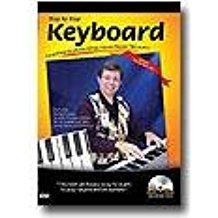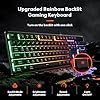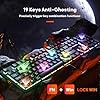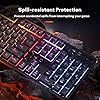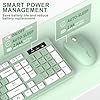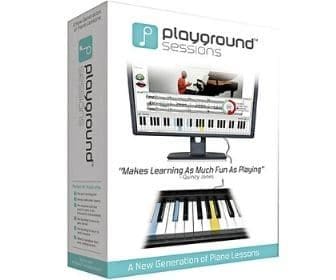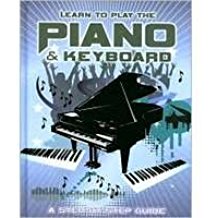
Source: Amazon.com
Are you at a loss on where to begin in the matter of mastering how to play your preferred songs? Nevertheless, whatever be your position on the skill level of your piano, the knowledge plus tools are available to make you master the keyboard faster (and really fun) than before!
Super Easy Piano Book for Adult Beginners: Guide to Chords, Notes, Rhythm, and Step-by-Step Keyboard Lessons for First-Time Learners Using Simple Techniques
$12.99 (as of January 11, 2026 00:27 GMT -08:00 - More infoProduct prices and availability are accurate as of the date/time indicated and are subject to change. Any price and availability information displayed on [relevant Amazon Site(s), as applicable] at the time of purchase will apply to the purchase of this product.)Learn to Play Piano: Step by step guide to playing the piano | Perfect for young people - early teens or older juniors
$12.99 (as of January 11, 2026 00:27 GMT -08:00 - More infoProduct prices and availability are accurate as of the date/time indicated and are subject to change. Any price and availability information displayed on [relevant Amazon Site(s), as applicable] at the time of purchase will apply to the purchase of this product.)How to Play Keyboard in 14 Days: Daily Keyboard Lessons for Beginners (Play Music in 14 Days)
$12.99 (as of January 11, 2026 00:27 GMT -08:00 - More infoProduct prices and availability are accurate as of the date/time indicated and are subject to change. Any price and availability information displayed on [relevant Amazon Site(s), as applicable] at the time of purchase will apply to the purchase of this product.)How To Play Keyboard: A Complete Guide for Absolute Beginners
It will aid you in teaching basic chord voicings, scales, positions plus music theory besides guiding on how to place items together to design your individual creations.
The keyboard comprises an amazing linear instrument. Besides being easy to understand, one can also get into love with it easily. So let’s begin.
- If you desire to learn how to perform keyboard or piano in an entertaining and interactive manner, go for “Piano for All”. This course contains ten detailed eBooks that include 500 audio lessons and 200 video lessons. And the best part is that the course functions on PC, iPad, Mac, iPhone and all Android phones and tablet. Grab your edition of “Piano for All” while stocks remain!
And if you’re out to purchase a fresh piano, make a comparison of few of the top vending digital pianos in the market with one another.
Table of Contents
Getting Started
Every person who’s planning to learn a fresh instrument should realize that instruments aren’t any cake-walk. Occasionally, there may be anyone who emerges as a prodigy, though majority of us must agree to make the effort.
Redragon K521 Upgrade Rainbow LED Gaming Keyboard, 104 Keys Wired Mechanical Feeling Keyboard with Multimedia Keys, One-Touch Backlit, Anti-Ghosting, Compatible with PC, Mac, PS4/5, Xbox
20% OffTECKNET Gaming Keyboard, USB Wired Computer Keyboard, 15-Zone RGB Illumination, IP32 Water Resistance, 25 Anti-ghosting Keys, All-Metal Panel (Whisper Quiet Gaming Switch)
25% OffWireless Keyboard and Mouse Combo, Full-Sized Wireless Keyboard and Adjustable DPI Mouse, 2.4GHz USB Receiver, Silent Keyboard and Mouse for PC, Windows, MAC, Desktop, Laptop (Avocado Green)
30% OffRedragon Mechanical Gaming Keyboard Wired, 11 Programmable Backlit Modes, Hot-Swappable Red Switch, Anti-Ghosting, Double-Shot PBT Keycaps, Light Up Keyboard for PC Mac
29% OffAmong the initial questions people wishing to master the piano or keyboard desire to understand is the actual amount of time needed to master the keyboard. In the matter of mastery, the duration involved to become “adept” in keyboard remains subjective.
Most people require years – few people sound like they’ve been performing during a decade inside a duration of few months. How fast you achieve your musical aims rests wholly on you plus the amount of time, effort and practice you give into attaining proficiency in your instrument.
It is recommended that you rehearse for a minimum of half an hour daily. This affords sufficient time to perform scales, rehearse chords and perform position changes. It is not necessary to assign hours for your keyboard daily, though you have to remain consistent.
Vital Tools
Keyboard choice is possibly the largest ingredient as regards learning, though you must also gear up for practice with some other items ready and by your side.
If you’ve ever viewed anyone perform the piano, it may have been observed that they had been sitting upon a bench. A few people with restricted resources may manage in the absence of bench, though benches are superior as they enable you to shift to the song.
Another wonderful accessory for any performer is a sustaining pedal, whether for mastering pop music or classical. This pedal assists in dragging out notes for them to perform within the background while you perform your instrument, furnishing a whole-bodied sound to your music.
Headphones are one more excellent accessory to include in your playing equipment. It enables you to master and perform music without being audible to others. Everyone exercise their preference in the matter of choosing headphones. A few keyboardists opt earphones whereas others go for headphones.
Some genuinely state-of-the-art keyboards operate efficiently with software which is downloadable onto your laptop. Certainly, software is not needed for playing a keyboard, while for a starter you should devote more time in collecting your playing expertise together than performing with software. Nevertheless, this should be known, particularly when you are spending huge quantity of money for your instrument.
Key Features
Most keyboards possess similar features, though the YPT-240 of Yamaha brand is ideal for starters. This keyboard with 61 keys contains 385 “usual” sound voicings. Those sounds comprise guitars, organs, percussive instruments, sound effects plus many more. Definitely, conventional pianos are not equipped with this function as they are wholly acoustic – implying they don’t have electric pickups.
Modernized Keyboards may link with smart gadgets including iPads, Apple iPhones and also iPods. The main EQ function enables you to alter the outgoing sound for your device to adapt it according to your likes or your present “sound situation”. Since acoustic pianos do not comprise electric instruments, it would actually require you to purchase equipment to attach your piano with equipment in order to make a recording.
The function of extremely-wide stereo lets you generate a broader sound – a feature that can render your compositions more aurally nice. This function is not possessed by acoustic pianos, neither do they require it as they, for a greater part, generate such large, dynamic and bold sounds.
Notes Mastering
The keyboards and pianos notes are precisely the same. Every note carries its own specific pitch – something which is accomplished on both keyboards and pianos.
All of us know that placing all those keys staring ahead of you may be somewhat intimidating. Most starting piano players are inclined to possess this notion that entire keys are separate notes when actually they are similar notes within a sequence performed at various octaves.
Mark there are 2 black keys side-by-side, a gap followed by 3 black keys side-by-side. At the left side of the 1st black key lies the note C. The next notes following C constitute a result of that note. The following provides more information concerning the piano keys.
The White Keys
The white keys represent complete notes. They do not include any accidentals – i.e, sharps and flats. The white keys signify seven normal notes, C, D, E, F, G, A and B, in given sequence.
These notes, at the order above, are really the C key. The whole of the notes: C, D, E, F, G, A, B and C comprise the tones that constitute the key. We are informed by the keys about what notes to perform in any particular song. Presently, you understand that when a song lies in the C key you will simply play your keyboard keys.
The Black Keys
The black keys comprise sharps and flats. The black keys may be slightly difficult to explain as they aren’t always sharps. Talking of sharps and flats, western music contains 2 notes that are without sharps/flats. These notes are B and E, that is why they are not separated from the remaining keys by any black key.
The 2 black keys adjacent to one another are D# and C#. In the order of 3 black keys the tones are F#, A# and G#.
While you may escape the black keys occasionally, don’t consider that you will master playing chords without them. Soon, you will learn about their mandatory requirement in many chord voicings.
Simply view A major with triad of A, C# and E or also D with triad of D, F# and A. Luckily, there are many song which you can master without leaping into chords utilizing the black keys very much.
A song which newbies are encouraged to attempt is Fur Elise within the key of C.
Mastering Your 1st Scale
Recall the white keys which were mentioned before. C, D, E, F, G, A, B and C. It comprises your 1st scale. The major scale C. This scale enables you to perform chords, melody and also arpeggios simply by employing it.
Utilizing the C key you can know your initial position, that is, as you guessed right, C position. Begin with the right thumb upon middle C ( the key is commonly displayed upon your keyboard ), position the index finger upon D, ring finger on F, middle finger on E and pinky upon G.
If you want to perform C position with your left hand, you will strike C2 with your pinky, D with the ring finger, E with the middle finger, F with the index finger and G with the thumb.
Observe that the sole finger performing the like note comprises the middle finger. All of the other fingers perform separate notes. Mastering how to handle your fingers plus shifting across the keyboard requires time. Don’t be discouraged! Rehearse moving ahead and back with this scale utilizing the like notes.
Scales are essential to mastering the keyboard as the permit you to “jam” and solo across chord voicings plus different instruments. The technique also aids acquaint you with keyboard notes and their different locations plus octaves.
Selective Enrichment
Mastering piano must not simply involve sitting down by your instrument carrying printed music notation. If you intend to learn fast, you should be ready to tread the extra mile. Your discretional enrichment can comprise games, books and also private instructions through a music instructor you rely on.
Among the initial things recommended for every instrumentalist is a book covering music theory. This theory instructs you how to transpose, read and compose music in an attractive, logical and easy manner. Mastering theory will enable you to pick any of your preferred songs and switch it within a key which is simpler to perform for you and hum along by.
Songbooks also carry worth for the instrumentalist. Many types of song journals are available for purchase. This, certainly, is subjective as you wish to choose things that attract your taste. If you have greater inclination towards pop, you wish to buy a pop songbook, whereas if you have a passion for the classical style, you should opt for something centered around that specific niche.
At the start, you actually wish to encompass yourself with items that you revel and feel comfortable with. A book that all music buffs should consider buying comprises The Complete Idiot’s Guide to Music Theory (Second Edition) by Michael Miller. This book guides your through scales, modes, progressions, ear training, chord formulas and also transposing to different instruments such as mandolin or Bassoon harp.
Whereas music theory doesn’t especially instruct you on how to perform your preferred number, it does instruct you on how to compose music itself. Numerous theory students build very precise aural skills which enable them to perform a song just by hearing it.
Similar to every other skill, this requires time.
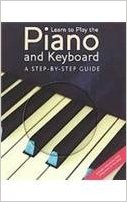
Source: Amazon.com
Rehearse Playing Whole Notes, Half Notes, And Quarter Notes
Whole notes, quarter notes and half notes are both written separately on printed music notation and they’re played separately also. Whole notes, written as void circles, are performed for 4 rhythms. Half notes, written as empty spheres with upward extending arms are performed for 2 beats. While quarter notes, written like filled-in spheres with upward extending arms are performed for 1 beat.
To rehearse, attempt performing whole note of C. Locate the white C key and hold it down with the pad of your finger. Press the key below and count upto 4. Then discharge the key. Attempt performing a half E. Locate the white E key and hold it downwards for 2 beats.
Acquaint yourself with the Major Scale C
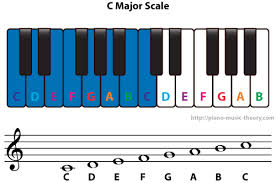
Scales of keyboard comprise collections of notes which are performed together. The Major scale C is among the most popular scales.
To perform the Major scale C, locate the C note upon the keyboard ( C is the first white key to the left of a collection of 2 black keys ) and hit it. Then play the adjacent white key on the right that is the note D, followed by the successive white key over, the E note, and keep on playing the following white key within the row till you arrive at the B note (the final note prior to the following C). You’ve just performed the Major Scale C.
Rehearse Performing The Chord C
A chord comprises a collection of notes being played together simultaneously. There exists a number of separate chords which can be performed, some easier than the rest. One elementary 3-note chord that you can begin rehearsing with comprises the chord C.
Rehearse performing the chord C with your right hand by putting your thumb upon the C note (recall that you may locate C by finding the first white key on the left of a collection of 2 black keys ), the middle finger upon the E note, and the pinky finger upon the G note. Hold down all the 3 notes simultaneously to hit the chord.
Rehearse Performing The F Chord

The chord F comprises another fundamental 3 note chord that is performed in the Major scale C. Rehearse playing the chord F.
Utilizing your left hand, put the pinky finger upon the F note (You can locate F by searching for the first white key on the left of a collection of 3 black keys), the middle finger upon the A note, and the thumb upon the C note. Hold down to play all 3 notes simultaneously.
Bettering Your Skills
Follow These Steps To Advance Your Skills
Rehearse Playing The Keyboard Daily
Try to spare a minimum of 30 minutes daily to rehearse and improve your skills. Concentrate on memorizing about the location of the tones upon the keyboard, while attempting to play more complicated scales and chords. Look for “free keyboard lessons” online or think about hiring a skilled keyboard instructor to assist you rehearse in person.
Rehearse Reading Sheet Music
After you’ve achieved the fundamentals, you can begin practicing real songs upon the keyboard. Look online for “free keyboard sheet music” if you’re seeking a number to play. Reading sheet music might be difficult initially, but after you master the musical notation you’ll become quicker. Some nice songs for starters to try out are:
- “Ode to Joy” by Beethoven
- “Waltz from Sleeping Beauty” by Tchaikovsky
- “The Entertainer” by Scott Joplin
Attempt Writing Your Individual Songs
After you know how notes, chords, scales and musical notation function, you can begin fiddling with songwriting. songs need not be complicated, simply write music which you can perform at your present skill level. You’ll have a nicer time rehearsing with your personal music.
To start songwriting, begin by testing with some chords and notes. When you locate something that interests you, pen the tones and attempt to construct the remainder of the melody from that point.
Experiment With Various Sound Configurations On Your Keyboard
Among the advantages of performing the keyboard lies in its including various unique, inbuilt sounds for you to toy with. Try shifting your keyboard setting from “piano” to “organ” or “harpsichord”. Play a few chords and notes and view which inbuilt instruments you cherish the most.
Conclusion
Mastering keyboard can be hard, but these basics will propel you on your way to performing like the masters. Don’t shy away from keeping a notebook to jot notes on things that you have difficulty in understanding or also make a binder to gather sheet music, notes and useful tips and tricks.
When you learn the piano initially, it takes some time to get accustomed to playing on two hands – permit yourself to grow finesse and coordination.

